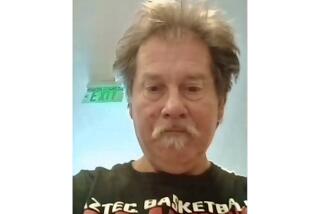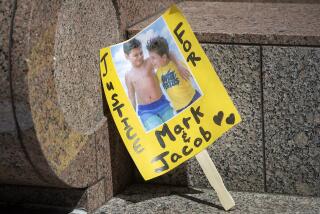Witness says he feared accused killers
A few years ago, a stranger made Jimmy Covington an irresistible offer.
He was sitting on the steps of a Hollywood office building when an elderly woman approached him. She said she would give Covington, who was living on the streets, a place to stay. And if he just filled out some paperwork, she could get him $2,000 in benefits within a month.
The woman seemed sympathetic and sincere at first. On the day he met her, she moved him into a minimally furnished room and brought three pages of paperwork, with some basic questions about his background.
But she came back the next day with more, and even more the day after that. The questions started getting uncomfortably personal. He left.
Covington, who testified in court Friday, said he realizes now how close he came to falling victim to the two elderly women who are accused of killing homeless men and collecting life insurance benefits.
After all, Helen Golay, 77, and Olga Rutterschmidt, 75, had taken out an $800,000 policy on his life.
From the witness stand, Covington pointed to Rutterschmidt and said she was the woman who demanded from him personal information, including his Social Security number, the date and location of his birth, his mother’s maiden name, family history and medical details.
“She was asking for too much personal information, and she wasn’t paying me every day like she said she would,” Covington testified. “I was getting uncomfortable with it.”
Rutterschmidt’s kindness quickly dissolved when he refused to answer some questions, Covington recalled. She yelled at him and slammed the door behind her. She started turning up at 3 a.m., demanding that he fill out more and more paperwork.
“She’d say, ‘What’s wrong with you. . . . You can’t remember anything, and we need to get this paperwork done,’ ” he told jurors.
After the women’s arrest in 2006, the Los Angeles Police Department made a public appeal for Covington and two other homeless men, who authorities believed at the time may have been targeted. Covington said he found out about the case when a homeless friend showed him a clipping from The Times about the plea, which included a photo of himself.
Not realizing that the women had been arrested, Covington said, he was afraid for his life for months, looking around suspiciously lest somebody run him over. “I could’ve been run over by car and killed,” he told reporters outside the courtroom. “I feel blessed.”
On Friday, jurors also heard testimony from a friend of a man who was less fortunate, Kenneth McDavid, who prosecutors say was run over and killed by the women in 2005.
Patrick Lamay said he met McDavid at First Presbyterian Church of Hollywood, where they would stand in line together for free Sunday meals.
Some time after McDavid started living in a Hollywood studio apartment provided by the women, Lamay moved in with him, offering to buy groceries and install phone and cable lines.
When he first visited the apartment, the refrigerator was empty save for a half-full bottle of soda, and McDavid seemed to have no means of buying food for himself, Lamay testified.
McDavid told him that he had an “arrangement” with the women under which Rutterschmidt paid the rent and asked him to sign life insurance documents as an “act of good faith,” Lamay said.
Lamay started getting suspicious and once followed Rutterschmidt to her car. But Rutterschmidt, who lived less than two blocks away, hired an armed security guard to force Lamay and several others, who had also moved in, out of the apartment.
Lamay recalled returning to the apartment to visit his friend. When he knocked on the door, the uniformed security guard answered the door. Over the guard’s shoulder, he asked McDavid how he was doing.
“Mr. McDavid cannot talk to you,” the security guard replied.
More to Read
Start your day right
Sign up for Essential California for news, features and recommendations from the L.A. Times and beyond in your inbox six days a week.
You may occasionally receive promotional content from the Los Angeles Times.







